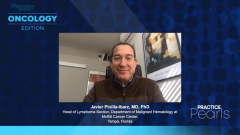
Key Clinical Trials for BTK Inhibitors in CLL
Javier Pinilla-Ibarz, MD, PhD, highlights key clinical trials in CLL assessing the safety and efficacy of FDA-approved BTK inhibitors ibrutinib and acalabrutinib.
Episodes in this series

Javier Pinilla-Ibarz, MD, PhD: We’re going to review the classic FDA-approved BTK [Bruton tyrosine kinase] inhibitors ibrutinib and acalabrutinib. Before, I mentioned that the first trial that put together ibrutinib in the second line was RESONATE, where it was compared with ofatumumab. Obviously, we had nice data, but later on in the front line was the RESONATE-2 trial data that was published. In our previous meetings, a 7-year follow-up was reported. Still, a significant amount of patients had a low amount of progression. However, we see that discontinuation for toxicity may happen in about 20% of patients. This emphasized, in the long-term data, that patients who tolerate this drug may do well in the long run.
One of the caveats is this trial did not include 17 prepatients, so we can’t make a conclusion. That’s the reason the Alliance for Clinical Trials in Oncology trial compared ibrutinib with or without bendamustine-Rituxan. PFS [progression-free survival] had very good data in 17p. This is for ibrutinib. As mentioned, ibrutinib is being compared with the best chemoimmunotherapy strategy in the younger population. We’re discussing ECOG-E1912, which compared ibrutinib-Rituxan against fludarabine-Rituxan-Cytoxan. It had a superior PFS and overall survival. It was well received, and at least the benefit mostly comes from unmutated patients. Mutated patients can surely benefit, but someone may argue that chemoimmunotherapy in younger populations may be a choice for some patients or for doctors who believe in these long-term data for FCR300, CLL8, and CLL10. However, in our institution [Moffitt Cancer Center], because of the long-term possibilities to produce MDS [myelodysplastic syndrome] and even in the other case of AML [acute myeloid leukemia], we try to stay away from fludarabine because the younger population may have a long time until they have multiple lines of therapy, and it could negatively influence the future of these patients.
I want to discuss the FLAIR trial, which was also presented at ASH [American Society of Hematology Annual Meeting]. That was the response to the ECOG-E1912 presented a group led by Pete Hillmen. They were introducing the same concept. However, it was interesting that in this case, the trial allowed older patients until 75…. The bottom line is that the PFS was superior to FCR [fludarabine, cyclophosphamide, rituximab] as we have in the ECOG-E1912. However, there was no difference in survival. There’s a lot of discussion around that. Obviously there are toxicities from FCR [fludarabine, cyclophosphamide, rituximab], but maybe in this case the older population may have worse tolerance to ibrutinib in some cases. Also, they may be compensated by the superior survival that we saw in the US trial.
In terms of second-generation BTKs, acalabrutinib, which is more specific than ibrutinib and has fewer targeted effects, mainly EGFR and other kinases that may be responsible for some of the adverse effects, like diarrhea. BTKs in general have a class effect, but it seems that acalabrutinib has diminished these issues. In this case, we’ve seen the ELEVATE-TN, which was treatment-naïve and compared acalabrutinib with or without obinutuzumab against obinutuzumab-chlorambucil. It had superior PFS reaching all the levels. It’s slightly superior when we compare acalabrutinib vs acalabrutinib-obinutuzumab. There’s not really a significant difference, and the trial did not statistically have the power to have this difference. It doesn’t have a role with ibrutinib, but it’s still unclear that obinutuzumab may have a role. The iLLUMINATE trial compares ibrutinib-obinutuzumab against obinutuzumab-chlorambucil. It didn’t have a single ibrutinib, so we can’t make this conclusion with ibrutinib. In the future, it’s unclear that we are going to make this conclusion with acalabrutinib.
It’s important to discuss another trial presented over the summer, the ELEVATE-RR, which compared head-to-head the best 2 BTK inhibitors on the market: ibrutinib and acalabrutinib. We also noticed that this trial was done in 11q and 17p. This is the hardest population. It’s heavily pretreated and very high risk—more than 50% has 17p and TP53 abnormalities. What comes from this study is that the efficacy was similar in both groups. There was a trial designed for noninferiority for acalabrutinib that was reached. The primary end point of the trial was to see toxicities. In this sense, there was less atrophy relation, something that can be seen with BTK inhibitors and that we’ve seen with ibrutinib. This was less of a problem with atrial fibrillation, when we compared with acalabrutinib. Other adverse effects were decreased, including headache, which is more common with acalabrutinib. The difference is they’re obviously very patient dependent on the patients. Certain patients may tolerate better or worse dependent of comorbidities, but I see something to discuss. This is something that has been well reported and something that also takes a role when we discuss the toxicity of these 2 different BTKis.
Transcript Edited for Clarity
Newsletter
Stay informed on drug updates, treatment guidelines, and pharmacy practice trends—subscribe to Pharmacy Times for weekly clinical insights.






























